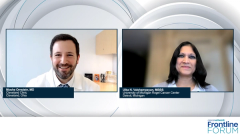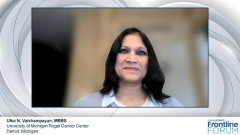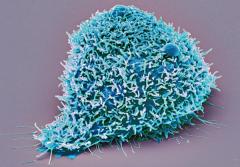
First-Line Therapy for Advanced RCC: Optimizing Adverse Event Management
A brief review of common adverse events inherent in the first-line management of advanced renal cell carcinoma and practical advice on how to mitigate treatment toxicity.
Episodes in this series

Transcript:
Moshe Ornstein, MD: The problem is all these IO [immuno-oncology]-based regimens have some toxicities associated with them. How do you generally approach this when a patient comes in with some toxicity, whether it’s from [ipilimumab and nivolumab] or one of the IO/TKIs [tyrosine kinase inhibitors]?
Ulka N. Vaishampayan, MBBS: For the immune checkpoint toxicities, if it’s just an IO/IO regimen, you anticipate some of the immune-related adverse events. The most common ones with [ipilimumab and nivolumab] are colitis and pneumonitis. Thyroid dysfunction can happen in all patients who are treated, whether with [a vascular endothelial growth factor] TKI or [an] IO. That is something you must monitor.
The biggest things I find in toxicity management tends to be: anticipate and educate. You must educate patients and their caregivers that even things that seem like a flu, an average infection, or fatigue may actually be adrenal insufficiency. For them to bring it to our attention sooner [is] better, so we can address it accordingly. That can save a whole lot of time and worsening of the toxicities.
The other thing is if there are suspected immune-related adverse events, [then we would] start immunosuppression [sooner], first with steroids and then move on to other immunosuppressive agents, such as infliximab or mycophenolate, if they’re not responding to steroids. The timing is fairly critical. You don’t wait weeks and weeks, [and] you don’t try to rule out every infection and try to do colonoscopies on these patients. Clinically, if they’re not improving on steroid immunosuppression, it’s time to move on and consider other heavy-duty immunosuppression. What do you think?
Moshe Ornstein, MD: I completely agree. I like how you phrase that in terms of being aware, anticipating, and educating. I tell patients and their families that no matter what [they’re] starting on day 1 [of their] first treatment, that’s the baseline, and [to] call with any changes. We have [staff] available 24/7. It’s really important. The time to start steroids is as soon as the word steroids comes to mind. You can always start it for a short period of time, then stop. But if you think a patient needs steroids, it’s critical. With IO/IO, it’s easier because you know the toxicity is immune driven. But with IO/TKI, sometimes for things like diarrhea or elevated [liver function tests], you must tease it out. It’s straightforward to hold a TKI for a few days and see [whether] things get better. If not, you move on to steroids. I like the idea of starting to educate the community about moving beyond steroids, and to know not [only] that we must give steroids—and we’ve known that now for 10 years—but [also] at what point are we moving beyond steroids? That’s the next level of education that we must share with oncologists and some of the subspecialists.
Transcript edited for clarity.
Newsletter
Stay up to date on recent advances in the multidisciplinary approach to cancer.










































